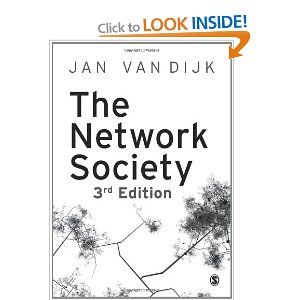Archive for the ‘Discipline’ Category
Globalisation and Global Politics no comments
Having taken some time out to consult my current notes and research I came to the conclusion that there are three areas that still need more development before I will begin writing out my Interdisciplinary Review. I need to; gain an understanding of globalisation, find a stronger core-text discussing Politics and find a more comprehensive examination of Facebook. For this week’s post I will discuss my readings on globalisation and the remaining topics will be discussed in the order above in the subsequent weeks to come.
The No-Nonsense Guide to Globalization – Wayne Ellwood

This book provides a great overview of the basic notions involved in globalisation and global politics. Though the book does take a somewhat biased view (the author clearly has some anti-globalisation sentiments) the text is easily understandable and details much of the impact and direction of globalisation through recent history. It is written essentially as an American counterpart to the “Very Short Introductions” discussed previously.
Two notions in particular struck me as applicable to discussions of social networking. Firstly, Ellwood notes that the process of globalisation has changed over time. Means of travel, trade, and interaction (languages) have changed dramatically even in recent years and this has greatly modified the way in which globalisation takes place. There are some parallels between this idea and how social networking has integrated with peoples lives. Where previously computers were the terminal of access to your social network now phones, games consoles and various other extraneous devices such as cameras all provide similar or alternative means to access this network. Just as we see the process of globalisation changed by the advances in communication we may expect similar implication for the rates and direction of expansion seen in social networks as our interactions with these networks change. Before discussing the second point I will introduce the second book I have consulted on the topic of globalisation:
Globalization- A Basic Text – George Ritzer

This book provides a significantly more detailed approach to globalisation however, one recurring theme becomes apparent that is seen in both Ellwood and Ritzer’s books and across the topics of discussion within the context of globalisation: control.
Globalisation can be argued to be a positive tool of expansion but this also often results in restrictions being imposed on those that live beneath its shadow. Examples such as the “Tobin Tax”, a tariff charge used to impose restrictions on the flow of wealth between globalised and globalising peoples. Though originally intended to protect the interest of citizens this can also have negative effects by impinging on people ability to interact freely or restricting the ways in which they interact to only those interactions deemed “acceptable”. This theme is seen throughout discussions of globalisation particularly involving issues like imperialism. To what extent do emerging global powers control the restrict the development of global culture by imposing their own norms upon others? Does such a trend exist in social networks with popular networks buying up smaller ventures before they can compete or by forcing users to become dependant on their structure by tying multiple online identities to a single social network user account? Are these kinds of effects deliberate or the natural outcome of expansion? Do networks impose restrictions on each others use just as nations states do on their citizens?
Whilst globalisation provides one useful area of discussion within the context of politics I still feel that I need a stronger political text to support my discussion of the topic. The next post to come will be a discussion of this text.
Economics, Models and Data. no comments
Economic theories are constructed using models and data. Models can be described as frameworks which organise how economists think about a problem. Models create a simplified and easier to manage reality with which to test theories. Data is the facts with which the model interacts, therefore the data needs to be relevant.
Data can be;
- Time series – which shows how a variable has changed over time. This is usually graphically represented.
- Cross sectional – shows a fixed point in time how a variable differs between groups or individuals.
Data is represented as;
- Index numbers – this allows the comparison of data without using units and showing any change relative to a base number. Indexes can also be expressed as averages.
- Nominal or real variables – nominal values show the price of things, whereas real values show the price of things taking into account the factors which may influence the price. For instance, a nominal value may have increased, but a real value would show the increase was due to rising labour costs and there was not an increase at all.
Economic models use empirical research to examine the realtionship of interest.
Therefore economists;
- Construct a theory
- Develop a model to test the theory
- Test the theory with data
Social Media no comments
This week I took a step back from the disciplines I have been studying and approached some literature on social media. My intention was not to become a social media expert but instead to approach the topic from the perspective of both sociology and politics. I read from one more technical textbook which examined both the structural nature and impact of networks within society; The Network Society by van Dijk, and one more narratively structured book centring on the beginnings, development and impact of the social media giant Facebook; The Facebook Effect by Kirkpatrick. Though both disciplines have a lot to say about each of the books I felt that certain topics and certain disciplines lent themselves well to providing comment on particular issues.
Structure and Sociology

The network society starts as a technically focused book and develops into an interesting sociological account of the impact of networks on everything from economics to social policy. With particular relation to the topics of social networking are the discussions of culture and psychology.
The book outlines a variety of perspectives on the cultural impact of networks and social media. This raises a common theme from the sociological literature with regards to technological v.s. social determinism i.e. whether peoples ‘use’ or technologies ‘structure’ and ‘purpose’ (if we take it to have explicit purpose) drives network development.
Equally, further points can be made with regard to the nature of modernity and social media; each country and even culture modernising at different rates and in different ways. It is not necessarily clear from the text how these interactions of different varieties of social media and/or what we might call the interaction of more ‘developed’ systems/networks have within the context of society. There is plenty of opportunity for interdisciplinarity here with both the social and political nature of Marxism offering some critiques within this context; in particular Weberian Neo-Marxism and it’s perspectivism.
Narrative and Politics

The Facebook effect documents the history of the site and it’s now famous owners. It would be impossible not to draw similarities between the formative processes which the site underwent and politics at large. Whether it be the questionable tactics used to obtain user informations paralleled with government spying for the “greater good” or the internal struggles between the site owners paralleled with every internal political dispute ever; the story of Facebook is undoubtedly one rife with politics. As is the case within the political discipline, Kirkpatrick does a fantastic job of historically recounting these ‘political’ struggles and disagreements even without explicit intention (though perhaps a little editorialised).
But, the book highlights an important feature of social networks and of politics often ignored on both accounts: politics (and Facebook) is not just about the relationship between those at the top and those at the bottom but with every individual at each level and everyone else. This of course provides substantial room for the discussion of the sociological factors that govern such complex interpersonal relationships.
Having reached this point in my reading I feel that I have a reasonable understanding of the basics of each discipline along with the topic I have chosen. My intention for the coming week is to return to my notes first and plan some aspects of my accounts of each discipline. When this process is complete the areas I find to be lacking in depth shall be the ones that are the subject of my further reading to come.
Slowed Progress But Marxism no comments
This week’s reading was somewhat disappointing. I had intended to get through more content however I found that much of what I was reading required a much deeper level of analysis to understand. For this reason, rather than exploring social networks or globalisation; I have focused more heavily on sociology and in particular one of the most famous thinkers to have influence the field: Karl Marx.
Both for Politics and for Sociology, Marx is held in very high regard. Despite how authors feel about the validity of Marx’s views; it is quite clear that most, if not all, commenter’s extend a degree of respect for the man regarding him as a thought leader both in his own time and beyond. Whilst I would have preferred a broader week of reading, the fact that Marx and Marxist theory exists so prominently both in sociology and politics I did not begrudge the topic the extra time I afforded it. I consulted two texts in particular.
Marx, Marginalism and Modern Society

This book offered a good introduction to Marx as a whole, in terms of both his contribution to politics and sociology. The thrust of the argument presented in this text is that Marx’s key contribution was his critique of the political economy. The author presents the case that whilst this was recognised to varying extents in politics and economics; sociological perspectives took longer to entwine themselves with Marxist viewpoints.
On reason for the eventually large scale adoption of Marxist theory within sociology is suggested to pertain to Marx’s views on materialism, in particular; Historical Materialism. The perspective argued that whilst history might have previously separated notions of personhood from thingness, history rather required a deeper account of interactions. For example, dissecting the “things” called institutions into the individual “people” they were made of. This view offers significant importance for sociology allowing far deeper consideration of the people that were previously amorphous entities. Many comparisons can be drawn between these notions and social networking. Not least because of the changing relationships such sites have had with their user bases over time but also at the level of individual users with the structural changes from simple lists of activity to Facebook’s features like “Timeline”. These most certainly can be argued to personalise “events” allowing them to become related much more closely to the individual they are associated with.
Classical Sociology

This book provided a good logical point of development for explaining the development of Marxist sociological theory. In particular it dealt with the ways in which Marxist theory has been modified or adjusted in what has been argued is a necessary process of modernisation.
This notion of modernisation does not reflect technological or social advancement explicitly but rather the sociological ideas about “modernity”. As before, this is essentially the view that different cultures/societies have modernised differently leading to “multiple modernities”. The author highlights that sociologists like Anthony Giddens have argued that modernity changes the social structure and as such requires a post-modern sociology. The means that only theories that account for such changes, only post-modern theories, are sometimes argued to be the only theories relevant to assessments of the modern world. This text’s author however, believes that Marxism exploits a loophole in this argument by way of the additional work done by one Max Weber.
The author argues that Max Weber’s neo-marxism, in particular the addition of Nietzsche’s perspectivism, is the key to incorporating Marxist theory into discussions of “modern” society. Perspectivism is the theory that the acquisition of knowledge is inevitably limited by the perspective from which it is viewed. This is infact a common view within sociology and has significant relevance to the nature of accounts of social networks. Does a persons experience of myspace or facebook vary if they are a “user”, a “business”, a “celebrity”, a “moderator”, a “site owner” and so on. When considered alongside political perspectives this is of course still deeply relevant. The nature of both a person’s position/perspective, the role that position/perspective implies and the power (or lack of power) that it entails all contribute the nature of the interactions they will experience.
For my reading this coming week it is my intention to focus on texts relating to social media. In particular The Network Society.
Blog Week 2 no comments
My reading for this module this week has been the incredibly weighty tome “economics”, 1994 4th edition by D. Begg, S. Fischer and R . Dornbusch, published by McGraw-Hill Book Company in Maidenhead. It is a very easy to read, entry level book which explains economics in a simplified and an advanced version. I stuck with the simplified version.
Economics is the study of human behaviour with the central issue facing economists being the almost limitless desire for goods and services when the resources the same goods and services depend upon maybe scarce. Economics studies how society decides which commodities to produce above another.Economics can be split into two areas, microeconomics and macroeconomics, which represent the differing methodologies at play within the field of economics. Microeconomics focuses on individual economic transactions about specific commodities whereas macroeconomics studies the interactions in the economy as a whole.
A researcher in the field of microeconomics would concentrate their research into why certain people purchase a certain item and then use the data they have collected to extrapolate a theory of human behaviour which can be applied to the general population. One critique that can be levelled at microeconomists is their simplicity allows them to ignore the wider picture. Indirect effects can heavily influence an economic decision.
Macroeconomists concern themselves with the economy as a whole. The analysis they undertake tends to focus on GDP, inflation and the labour force. They are more likely to concern themselves with how government policy is affecting the economy.
Economies are not the same for each country. There are three different types of economies, firstly, the command economy. The command economy is a term used to describe when a central office makes all economic decisions. Secondly, the free market economy. This term is used to describe a situation where no one is intervening in the market and individuals pursue their own self interests. Despite the lack of regulation it is posited that a invisible hand would guide the market. Lastly, the mixed economy. A mixed economy is one which is a blend of the command economy and the free market economy. Mainly the economy is allowed to follow a free market style but government regulation is needed in certain areas. This is the type of economy which we currently experience in the United Kingdom.
The study of economics can be undertaken for two reasons. It may explain why things have happened or it may seek to explain what should happen. The first type of economic study is called positive economics and the second type is called normative economics. Normative economics is open to subjective value judgments, whereas in positive economics researchers are likely to come to the same conclusions.
Next week I will blog about how to undertake economic analysis and the methodologies involved.
Perspectives of Psychology and Marketing on the issue of Self-disclosure on the Web no comments
The opportunities that marketers are provided with in cyberspace have led them to seek means to facilitate a two-way communication with consumers aiming at building a relationship of trust with them. Given that marketing is much broader than selling as it encompasses the entire business seen from the point of view of its final result, that is, from the customer’s point of view, the ability of marketers to glean the types of information needed often depends on consumer’s willingness to volunteer such information.
This essay aims to examine to what extent consumers’ behaviour in cyberspace differs from the ‘real-world’ behaviour and whether concerns about privacy as well as scepticism about how marketers use data prevent consumers from disclosing personal information. The fact that marketing is based on the study of the psychological characteristics of consumers who engage in voluntary self-disclosure, combined with the application of psychological theories and techniques to marketing, indicate the close relationship between these two disciplines.
In order to unfold the different approaches on the abovementioned issue, I decided to first get myself familiar with the basic concepts and techniques of psychology. Psychology is both an applied and academic field that studies the human mind and behaviour. Research in psychology seeks to describe human thought and behaviour, explain why these behaviours occur, predict how, why and when these behaviours will occur again in the future and modify and improve behaviours to better the lives of individuals and society as a whole. There are three types of research methods, causal, descriptive and rational, while psychologists use a range of techniques including naturalistic observation, experiments, case studies and questionnaires. Topics and questions in psychology can be looked at in a number of different ways; some of the major perspectives in psychology include the biological, cognitive, behavioural, evolutionary, humanistic perspective.
Given that the web has created a new type of society where the presence of other human beings is implied rather than actual, I particularly focused my interest on the discipline of Social Psychology which aims to understand and explain the impact of the social environment on the thought, feeling and behaviour of individuals. A basic concept of social psychology that describes our everyday interactions is the concept of self-disclosure which is defined as ‘the voluntary making available of information about one’s self that would not ordinarily be accessible to the other at that moment.’
Self-disclosure has received considerable attention from consumer psychologists as it plays a vital role in relationship development and maintenance. Although self-disclosure research has shown that people are reluctant to divulge information about themselves, one notable exception to this rule involves the norm of reciprocity which refers to the tendency for recipients to match the level of intimacy in the disclosure they return with the level of intimacy in the disclosure they receive; people are more likely to engage in self-disclosure if they first become the recipients of such disclosures from their conversational partners. A few researchers have suggested that consumers interact with the source of electronic communications in the same way they interact with other people; therefore reciprocity could make consumers more involved in self-disclosure even in cyberspace. Thus, theoretically, in order to trigger the reciprocity principle, a company would first have to reveal some information about itself to the consumer.
Botha, B., Strydom, J., Brink, A. (2004) Introduction to Marketing. South Africa: Juta and Co Ltd
Cialdini, R. B. (1993). Influence: Science and practice. New York: HarperCollins.
Derlega,V. J.,& Chaikin, A. L. (1977). ‘Privacy and self-disclosure in social relationships’. Journal of Social Issues, 33, pp. 102–115
Gross, R. (2010) Psychology: The Science of Mind and Behaviour. London: Hodder Education
Hill, C. T., & Stull, D. E. (1982). ‘Disclosure reciprocity: Conceptual and measurement
Issues’. Social Psychology Quarterly, 45, pp. 238-244
Holtgraves,T. (1990). The language of self-disclosure. In H. Giles & W. P. Robinson (Eds.), Handbook of language and social psychology. Chichester, U.K.: John Wiley
Joinson, A.N. (2001). ‘Self-disclosure in computer-mediated communication: The role of selfawareness and visual anonymity’. European Journal of Social Psychology, 31, pp. 177–192
My Week Of Very Short Introductions no comments
In the previous week I listed several books on politics I was considering as reading for introductory texts. Having looked into each of these; I found they were either very dense in their content or too specific in their details to give a broad enough introduction. Having re-examined recommended pre-reading and undergraduate introductory texts I came across the Routledge “Very Short Introductions” books and the recommendation of one university of the “Very Short Introduction to Politics”.
My initial reading of this text has prompted my decision to change my topic of discussion from “cryptography” to “citizenry on social media”. Having decided on Politics as my topic area over Politics Science; this offers the ability to make a variety of historical comparisons and contrast the developments of states and their relationships with their citizens against the development of social media sites and their relationships with users.
The book gave a relatively detailed account of the varieties of social organisation that have been implemented throughout history ranging from ancient despotism and feudalism to modern dictatorships and democracies. There are clear distinctions to be drawn between different components of these organisations and the emergence of social media. However, it is interesting how the development of end-user agreements and the rights that they hold/with-hold have mirrored some aspect of the development of many political histories.
Not wishing to miss out on a greater level of factual content I also completed readings of “Very Short Introductions” to “Democracy” and “Communism” and intend to look briefly at “Socialism”, “Human Rights” and “The United Nations” to bolster my contextual knowledge. I have also looked into the further reading of undergraduate texts on globalisation with a view to contrasting the interaction and relationships of states with the interactions between and relationships of users with different social media sites.
This week I have also completed notes on the topics of:
Jean Baudrillard
Marxist Sociology
Ethnocentrism
Emile Durkheim
The Chicago School of Sociology
Critical Theory and
Post-Structuralism
I will be looking to do some study on the nature of social media this coming week along with developing my knowledge of “modernity” in sociology with a particular focus on the nature of Post-Modernism.
Geography, Economics and Digital Piracy. no comments
For this interdisciplinary review module I will be attempting to apply the key theories of geography and economics to the web issue of digital piracy.
In order to being this project I started with geography and a book called “Key Methods in Geography”, 2nd edition, edited by Clifford, French and Valentine. On first reading the introductory chapter was very reassuring and outlined research methods that I was already familiar with from applied social science. Research can be quantitative or qualitative and seems to be split between physical and virtual geographies. Virtual geographies would seem to be a mix of psychology and anthropology and may or may not relate to the physical world.
Quantitative research would appear to relate to positivism and suggests a very traditional scientific methodology, whereas as qualitative research recognises that human behaviour is messy and humans do not always follow the rules. Other critiques of positivism in geography include Marxist geographers who suggest that capitalism is reproduced in positivism; post-structuralist and feminists geographers would critique both positivist and Marxist geographers for failing to acknowledge multiple realities. A Humanistic approach to geography would take into account representations in popular culture.
However, these approaches are not polar opposites and can be combined.
Geographical research can also be regarded in terms of extensive or intensive. Extensive deals with large data sets and looks for patterns and regularity, whereas intensive studies small or single case studies. Time and cost often have implications on which type of research is undertaken and extensive research often uses secondary data sets.
This reading has been mainly detailing different methodologies for use in geographical research and I need to undertake some research into theories and principles in geography.
Intro to economics no comments
Having initially planned to research Economics and Sociology, I have now decided to change tack a little bit. I’ve now decided to look at Economics and Philosophy. I saw the first option as a fairly safe bet, and after hearing some of the adventurous plans of the rest of the group, not least of which Rob’s venture in to Oceanography and complex systems (!?), I thought I would push the boat out and dip in to Philosophy.
I’ve started my reading with two introductory Economics textbooks. One aimed at A-level students and one aimed at undergraduate students. This has worked really well so far as it has allowed me to gain a more shallow but wide overview from the A-level textbook, and when I’ve found a topic that I want to delve deeper in to I can look it up in the more detailed undergraduate textbook. Fortunately the contents page of the two textbooks are almost identical, both covering the same topics just in differing levels of detail.
So far I have learnt that Economics is split in to two sections, micro and macro Economics. Microeconomics is the study of economic decisions made by particular individuals and businesses, e.g. whether buying a piece of new tractor is worth the investment for a farm. Macroeconomics is the study of the economy and the whole and focuses on economic decisions made by governments, for example asking questions like ‘will investment in education now mean the nation will have a more skilled workforce in 20 years time?’. These two approaches seem separate but are actually interdependent, with many issues overlapping; economic decisions made by governments effect small businesses, and how small businesses perform effect the government’s decision making. Effectively microeconomics takes a bottom up approach to studying the economy whereas macroeconomics takes a top down approach.
The web issue that I will focus on is digital piracy. I’m not sure at this point whether I will look at this generally on all types of digital content or pick a media to focus on. I’m leaning towards focusing purely on music piracy. Demand curves described by the textbook speak about how as the price of a song drops, the buyer will purchase more songs. A rise in price will always mean a drop in demand and a fall in price will always cause an increase in demand. However the relationship between demand and price is not linear becuase willingness to buy more of a product drops as the number of purchases increases, this leads to what is known as effective demand. At first glance this seems like a theory that can be applied to the change in how music has become available for people to access either more cheaply or free (an economic view wouldn’t take in to account that the free option is illegal, it changes demand none the less), which may help explain the recent decline in the music industry.
In the following week I will start reading about Philosophy, the idea being to get a broad understanding of how philosophers approach problems, and then with a view to look at how moral philosophy can apply to illegally downloading music on the internet.
EWI: Philosophy and Law no comments
So I had a bit of a read this week around some of the philosophy texts. There are a number of different ways of interpreting or describing how philosophy is divided up into a discipline. This is, I suppose, a consequence of what philosophy is like in general. Philosophers hardly ever agree on anything, even when it comes to describing what it is that they do. Some people think that all of philosophy can be divided into two basic categories: realism, and the rest. Realism is the view that there is stuff that is real. The rest is, well, lots of other things. However this way of dividing up philosophy is controversial. The Cambridge philosopher Siumon Blackburn for instance in his book ‘Think’ suggests that it is perhaps not very helpful to divide up philosophy as a disicipline into these neat little categories. It is rather too dependent on the ability to taxonomise the arguments that are actually made. But there is no objectively correct way to do this that everyone can agree on. A philosopher’s job is to think about stuff. No wonder they can never agree on anything, including their own job description!
An alternative way of dividing up philosophy is to describe the different kinds of subjects that philosophers look at. This taxonomical approach has the advantage that it does not try to divide up philosophical approaches according to the arguments that are made: it is merely divided up by subject, not by the views taken on that subject. For instance, we might say that there are philosophers interested in questions of epistemology (knowledge), logic, politics, aesthetics, metaphysics, morality, and so on. This way of dividing it up does not say anything about what views the philosophers are taking on these different questions. So you could have the realists and the non-realists all lumped together into one category: the question of logic, say. However there are also problems with this way of describing philosophy as a discipline. Many of these areas overlap into each other, and there doesn’t seem to be any particularly objective reason, other than the causal whim of the observer, why we would divide these categories up in this particular way rather than any other.
From a personal perspective, I am inclined to describe the subject of philosophy in the way that it is often divided up in the university faculties, and the way that it is often divided up in the textbooks. You have things like philosophy of religion, philosophy of science, philosophy of language, philosophy of politics, philosophy of history, and so on. The discipline doesn’t have to be divided up this way necessarily; it just happens to be that it often is.
The particular area of philosophy that I am really interested in for this course is philosophy of law, and especially how this speaks to the internet. To some extent internet is still in its formative period. This is a time when internet legislative and constitutional precedent does not yet exist for the most part. So now is our opportunity to try to make decisions about what these precedents should look like. This is an area that I have never studied before and while there is a large amount of literature of philosophers commenting on law and legal procedures (sometimes known as jurisprudence) I do not know whether there is any substantial commentary by philosophers on internet law specifically. I did find one book by the philosopher Gordan Graham, ‘The Internet: A Philosophical Enquiry’. The book is quite out of date unfortunately (1999) but it is the only text I have been able to find so far on this subject. In general I liked the book and would recommend it. It is reasonably well written, though it is very wide-ranging and swings from one thing to another. But I think this is OK. Graham talks a little about the history of the internet, some of the technical aspects (not so relevant now perhaps) and puts this in the context of the history of technological development generally. Then he really lets it rip and has lots of fun talking about obscure and pretty much unrelated things like democracy and the internet (offering a dashing sweeping critique of democracy along the way), the nature of reality (is the internet a new form of ‘the real’?) and questions of the changing human experience (what has internet done to human individuality and community?). While this does seem a little bit all over the place, I think there are many really interesting ideas in here. The main point I take away from the book is the question of: to what extent should law on the web be different from law in the ‘real’ world (by which I mean the world off the web)? I mean, laws in the non-webby world are supposed to legislate over non-webby things, right. But the question is, how great is the disparity between webby stuff and non-webby stuff? And how great is the disparity between webby law and non-webby law? At this early stage, I am inclined towards the view that perhaps the disparity is a very big one indeed, much bigger than we had thought. This is something that we should probably find quite disconcerting. Do we need a set of laws for the ‘real’ world, and another set of laws for the virtual world that we have created?




